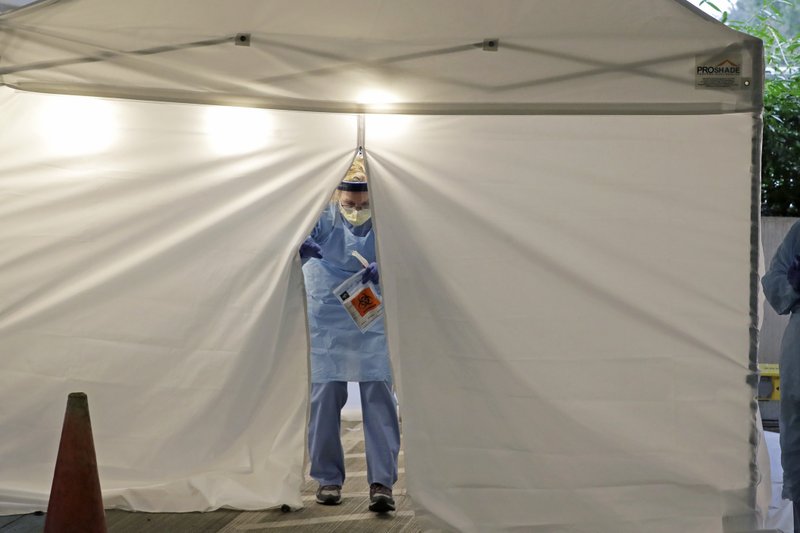Government and hospital leaders are increasingly sounding the alarm about the health care system in the U.S. and its readiness to absorb waves of patients in the worst-case scenario involving the new coronavirus outbreak.
Authorities nationwide already are taking major steps to expand capacity with each passing day, building tents and outfitting unused spaces to house patients. They also are urging people to postpone elective surgeries, dental work and even veterinarian care. New York’s governor called for using military bases or college dorms as makeshift care centers.
Among the biggest concerns is whether there will be enough beds, equipment and staff to handle several large outbreaks simultaneously in multiple cities.
Dr. Anthony Fauci, the National Institutes of Health’s infectious diseases chief, said it’s critical that steps be taken now to prevent the virus from spreading quickly.
“The job is to put a full-court press on not allowing the worst-case scenario to occur,” said Fauci, who appeared Sunday on several network news shows.
While he does not expect massive outbreaks in the U.S. like those in Italy, he said there is the possibility if it reaches that point that an overwhelming influx of patients could lead to a lack of supplies, including ventilators.
“And that’s when you’re going to have to make some very tough decisions,” Fauci said.
In Washington state, which leads the nation in the number of positive COVID-19 cases with more than 600 illnesses and 40 deaths, the increase in people visiting clinics with respiratory symptoms is straining the state’s supply of personal protective gear worn by health care workers.
The federal government has sent the state tens of thousands of respirators, gowns, gloves and other protective gear for health care providers. But those shipments aren’t enough, said Clark Halvorson, Assistant Secretary of Health for Public Health Emergency Preparedness and Response.
The disease has infected over 162,000 people worldwide, and more than 6,000 people have died so far.
Most people who have tested positive for the virus experience only mild or moderate symptoms. Yet there’s a greater danger and longer recovery period for older adults and people with existing health problems.
The nation’s hospitals collectively have about a million beds, with 100,000 for critical care patients, but often those beds for the sickest patients are mostly filled, Scott Gottlieb, a former FDA commissioner, told CBS’ “Face the Nation.”
“If we do have multiple epidemics in multiple large U.S. cities, the system will become overwhelmed,” he said.
New York Gov. Andrew Cuomo has suggested mobilizing the Army Corps of Engineers to turn facilities such as military bases or college dorms into temporary medical centers.
“States cannot build more hospitals, acquire ventilators or modify facilities quickly enough,” Cuomo wrote in an opinion piece published Sunday in The New York Times.
Officials in the Seattle area have been setting up temporary housing — and even bought a motel and leased another — to add space for patients who might be homeless or whose living conditions might not allow for self-isolation, such as students in college dorms. King County also is setting up modular housing and is using the arrivals hall at a county-owned airport as a shelter to reduce overcrowding — and meet social-distancing requirements — in existing homeless shelters.
Hospital executives say they’re always planning for disasters and have been concentrating on coronavirus preparations for the past two months.
“If you go past our emergency department now, you’ll see tents erected in the parking lot that allow us to increase emergency department capacity,” Johnese Spisso, president of UCLA Health, said Sunday on NBC’s “Meet the Press.”
The system’s network of clinics throughout Los Angeles and Southern California have additional capacity and doctor’s are encouraging telemedicine, he said.
Dr. Peter Slavin, the president of Massachusetts General Hospital, said the next two weeks will be critical as the medical community expects a dramatic increase in the number of cases.
Ohio Gov. Mike DeWine recommended on Saturday that elective surgeries be postponed, including dental and veterinary procedures, so that health care workers won’t be stretched thin and surgical masks can be saved for health care workers dealing with the virus.
ProMedica, which operates 13 hospitals in Ohio and Michigan, is ready to call in help from staffing agencies if needed and is looking at ways to provide child care for employees whose children are off school, said Deana Sievert, chief nursing . Doctors also have voluntarily canceled their vacations.
The community “can flatten off the curve of this,” by avoiding large events, staying at home, washing their hands and practicing social distancing to help U.S. hospitals avoid an onslaught of cases, said Dr. Penny Wheeler, CEO of Minneapolis-based Allina Health, which has 12 hospitals and more than 90 clinics in Minnesota and Wisconsin.
Allina also has been canceling conferences, meetings and anything else that does not directly impact patient care.
(AP)











